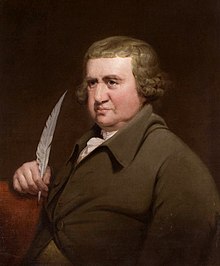The grandfather of Charles Darwin, named Erasmus, is
pretty famous in his own right. Erasmus
was a physician by trade; also a philosopher and poet. He was born, and lived in, the same town as
Samuel Johnson; Lichfield. Erasmus died on
April 18th, 1802.
The connection to Sir Walter Scott for today involves
Darwin’s writing, and a controversy over some lines he “borrowed” from fellow
Lichfieldian Anna Seward. The issue is
described in Ernst Krause’s “Erasmus Darwin".
‘The whole case
is unintelligible, and in some respects looks more like highway robbery than
simple plagiarism. Mr. Edgeworth [Richard, the father of Scott’s friend Maria Edgeworth], in
a letter (Feb. 3, 1812) to Sir Walter Scott, says that he had expressed surprise
to Dr. Darwin at seeing Miss Seward's lines at the beginning of his poem, and
that Dr. Darwin replied : " It was a compliment which he thought himself bound to pay to a "
lady, though the verses were not of the same tenor as his own." But this seems a lame excuse,
and it is an odd sort of compliment to take the verses without any
acknowledgment. Perhaps he thought it fair play, for Edgeworth goes on to say
that " Miss Seward's ' Ode to
Captain Cook ' stands deservedly high in
public opinion. Now to my certain knowledge most of the passages which have
been selected in the various reviews of the work were written by Dr. Darwin. I
knew him well, and it was as far from his temper and habits, as it was
unnecessary to his acquirements, to beg, borrow, or steal from any person on
earth." These passages at any rate show how true and ardent a friend Edgeworth
was to Dr. Darwin long after his death…’
